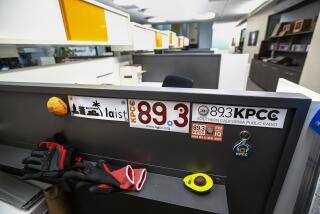Bay Area Stations’ Early Prime-Time Gamble Looks Shaky : Television: The programming experiment was aimed at drawing more viewership to local news programs. But the results range from so-so to disastrous.
- Share via
SAN FRANCISCO — It turns out that San Francisco might not be ready for early prime time.
Initial results from the Bay Area’s experiment with “early prime-time” television programming are in, and they range from so-so to awful, depending on the station.
Citing baby boomers’ earlier-to-bed habits, two network affiliates last February took an expensive gamble by switching, amid great fanfare and costly promotions, to the earlier programming. Network sitcoms and dramas were shown from 7 to 10 p.m. instead of 8 to 11 p.m., in hopes that more viewers would watch the local news that followed. The bigger the ratings, the theory went, the more stations could charge for advertising for those local programs.
Figures from the May ratings “sweeps” period show that the shift has proved to be at best a middling success for CBS affiliate KPIX and pretty much of a disaster for KRON, the NBC affiliate that initiated the idea. KGO, owned and operated by ABC, benefited from the turmoil with a sizable ratings gain for its late-night news show, now the lone contender at 11 p.m.
“A lot of my friends (in the Bay Area) seemed to like the idea of the shift, but it didn’t show up in their viewing habits,” said Matthew Shapiro, vice president of programming for MMT Sales Inc., a New York-based company that sells national advertising time on client stations. “Based on these results, I certainly haven’t heard any West Coast stations we deal with clamoring to jump on this bandwagon.”
This could turn out to be good news for the networks, which, despite public pronouncements that they are willing to study a switch to earlier prime time, are privately apprehensive of the move because they fear that it will hurt their ratings.
KRON, owned by the company that publishes the San Francisco Chronicle, suffered declines for both late-night news and much of the network’s prime-time programming, including such veterans as “Cheers” and “L.A. Law.”
Accentuating its troubles, KRON last week announced the resignation of its news director, Al Goldstein. The 10 p.m. program was slashed last month to 30 minutes after an hourlong program bombed; the station is still awaiting a waiver from the Federal Communications Commission that would enable it to broadcast “The Tonight Show,” now shown at 11 p.m., at 10:35.
At KPIX, the CBS affiliate, results have been better but still well short of a ringing endorsement for the change. Nonetheless, station executives say they are encouraged by a 1.5% boost in the Nielsen rating for its hourlong 10 p.m. newscast.
“We went into this knowing that it’s going to take a long time,” said Rosemary Roach, research director at KPIX.
Meanwhile, independent KTVU in Oakland, a feisty Fox affiliate that has broadcast its news at 10 p.m. for the last 34 years, has managed to more than hold its ground against the two new competitors. In fact, the station’s rating rose in the May period to 10.1% of the local audience, from 7.8%.
Nielsen figures indicate that Bay Area stations experienced a 5% rise in the May period in late-night news viewing. Station executives and consultants noted that much of that rise--in a notoriously apathetic viewing market--undoubtedly was accounted for by viewers who soaked up live coverage of the Los Angeles riots, rather than by the shift to early prime time.
Amy McCombs, KRON’s general manager and the station’s most fervent proponent of early prime time, said the station plans to continue its test through May, 1993. “We’re learning as we’re going,” she said, adding: “I’ve seen no outright rejection of the concept.”
In the meantime, a longer-running experiment with early prime time in Sacramento is showing similar lackluster results. KCRA, an NBC affiliate that got permission to shift last September, has asked the FCC to extend its programming waiver for a year beyond its Monday expiration. Early negative results have been disappointing--and somewhat expensive, since the station has reportedly had to pay NBC to compensate for under-performing prime-time ratings.
But KCRA is reluctant to give up. As a station attorney acknowledged to Broadcasting magazine: “It’s just taken a little more time to re-establish viewing habits than we expected.”
More to Read
The biggest entertainment stories
Get our big stories about Hollywood, film, television, music, arts, culture and more right in your inbox as soon as they publish.
You may occasionally receive promotional content from the Los Angeles Times.











